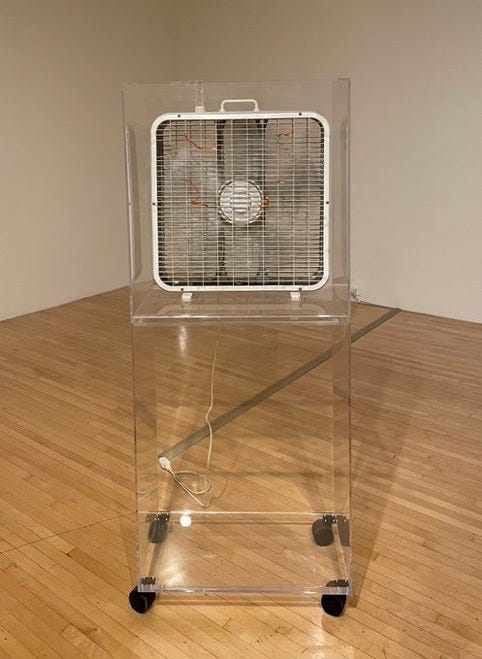I recently came across an image of an art exhibit: a vacant room with pale wood flooring and overhead lighting. The only object was centered on the floor, a white plastic box fan standing on a plexiglass stand, protected by plexiglass walls. The caption read:
“Soon after the death of his lover Stephen Earabino from AIDS, Los Angeles conceptual artist [John] Boskovich discovered that Earabino’s family had completely cleared out his apartment, including the artist’s possessions, save for the electric box fan in this work. An entire person, existence, and relationship had been erased, like so many were during the AIDS crisis. Boskovich encased the fan in Plexiglas as a kind of evidence and added cutouts to allow its circulated air to escape and be felt by the viewer, almost like an exhalation. In a sense restoring Earabino’s breath, at least as a facsimile in memoriam, Boskovich makes a tender and brokenhearted gesture toward some form of eternal life.”
For most of my twenties, I used a secret code to communicate with the men I dated--expecting that if they truly knew me, if we truly shared a connection, they should be capable of understanding the world from my perspective and therefore predict what I wanted or how I was feeling in any given situation. Because no one I interacted with possessed this impossible psychic quality, I was often accused of being aloof and indifferent. Reading the above caption reminded me of one of my favorite books at the time, Dennis Cooper’s My Loose Thread.
In My Loose Thread, a depressed, sexually confused high school boy named Larry is hired to kill another depressed high school boy, Bill, and retrieve his journal for $500. Because it’s implied that the journal contains confessions of Bill’s gay, possibly non-consensual encounters with the guy paying Larry, Larry is instructed to destroy the journal without reading it. But Larry does read Bill’s journal before killing him, and its contents drive Larry insane with conflicting desires and remorse.
To Larry, reading Bill’s journal symbolizes an impassable form of intimacy. Before his death, Larry watches Bill scribble in his journal—he often writes in the presence of others—and locks it with a tiny padlock: a reminder to those watching that he is both himself and a second, secret person, the version recorded and stored away in his notebook.
Excerpts from the journal are referenced like religious texts; like something too holy to repeat, the journal is never cited. Larry carries it around with him for days after the murder, then burns it. The weight of his intimacy with Bill as he reads his private thoughts--an intimacy he’s never known, having grown up in an emotionally distant and frigid family--threatens to unglue him. Bill functions as a funhouse mirror of Larry, confronting him with his repressed desires suddenly laid bare. Bill understands Larry when Larry struggles to understand himself. Seeing himself in Bill ignites Larry’s bitter resentment.
After reading My Loose Thread, I imagined a different outcome: one in which Larry doesn’t murder Bill. Because I concealed my emotions behind stoic behavior I believed would protect me from possible rejection, I understood Larry and Bill’s opaque, codified relationship as the same kind I expected from men I dated. I thought the most intimate thing you could do for someone was allow them to read your journal, to see the world the way you understood it when you thought no one else was watching, when you were stripped of all performative inclinations. I imagined them in love.



Wow. I’ll have to look up My Loose Thread now
Did you let men you dated read your journal?